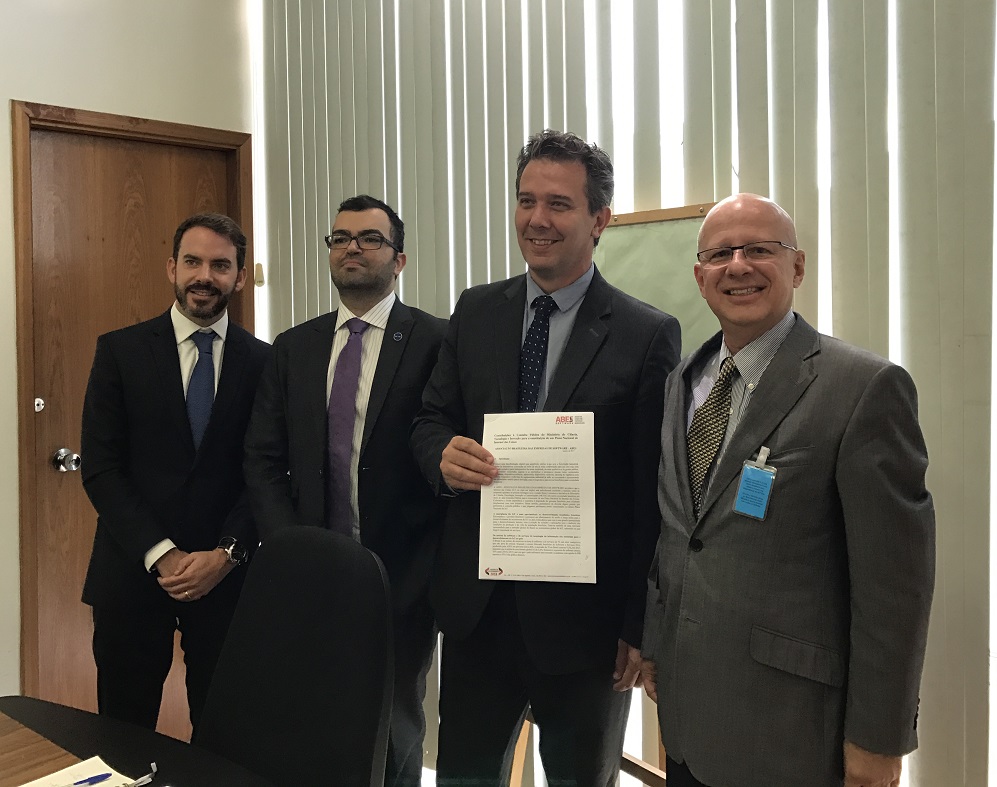Fábio Rua, Otavio Caixeta, Maximiliano Martinhão and Francisco Camargo
Representatives of the entity met with
the Secretary of Information Technology Policy, Maximiliano Martinhão
To present ABES' contributions on the National Plan for the Internet of Things (IoT), which is open for public consultation until February 6, representatives of the entity met this Wednesday (25) with the MCTIC's Secretary for Information Technology Policy, Maximiliano Martinhão, and with Chief of Staff of the Secretary for Information Technology Policy (Sepin), Otávio Caixeta. In addition to the entity's president, Francisco Camargo, Fábio Rua and Werter Padilha, coordinators of the ABES Regulatory and IoT Committees, respectively, also participated in the meeting.
“IoT is an extremely current topic, as technologies are becoming popular, but planning is needed so that the available resources are maximized and effectively benefit the whole of society. ABES represents around 2000 companies in the IT sector in Brazil, including startups, so it has an important role to play in building an environment in Brazil that encourages digital transformation, encourages cooperation and innovation, in addition to boosting competitiveness. , the growth of the market, strengthening companies and professionals in the segment”, highlighted Camargo.
According to the document delivered by ABES, the emergence of IoT is an opportunity for Brazilian economic development. ABES highlights the growing local performance of the information technology software and services sectors, fundamental for national development and competitiveness, and draws attention to the relevant role of the State as an inducer of IoT development. Discouraging the implementation of specific regulations for IoT, the entity warns of some points that it considers important to be covered by the National IoT Policy, such as security, privacy, interoperability, among others.
The full position can be accessed here.
According to Fábio Rua, the communication, crossing and analysis of data provided by the Internet of Things have been rapidly transforming the way of doing business and living in society, which also has a positive impact on public management. “A digital government, in addition to inducing good practices, has the potential to increase the transparency of public management, in addition to providing services that are increasingly connected, efficient, agile and integrated with the needs of citizens”.
Werter Pabilha considers that it is undeniable that Brazil will be one of the major global players in terms of IoT in the next decade, due to its economic, population and territorial representation. “The question is whether we will be a mere consumer market or whether we will establish ourselves as generators of IoT technologies and services, whether to meet domestic demand, as well as other world markets in some strategically chosen verticals”, he explained. “The National IoT Plan has great weight and value to orchestrate these initiatives among associations, institutes, academics, public organizations and the private sector, financial and development sector, in a coordinated way so that in the synergy of the set we will make history and enjoy result”, he concluded.
public consultation
The public consultation seeks to identify key topics for the feasibility of IoT in Brazil. Divided into several items, the document aims to obtain the opinion of the various agents involved in order to build a diagnosis of the IoT challenges and opportunities in the country. The results will be made available in a consolidated manner and discussed by the IoT Chamber, created by the Brazilian government in 2014.
Management, information security, investments in innovation, data protection and analysis, integration between technologies and platform standards are some of the relevant aspects that need to be considered in a National IoT Plan.
In addition to the public consultation, MCTIC and the National Bank for Development (BNDES) carry out, in parallel, a technical study that will diagnose the national scenario and propose public policies on the Internet of Things, stimulating cooperation and articulation between companies, public authorities , universities and research centers.
All the movement in the world market has encouraged companies and other actors in the research and development ecosystem to bet on software, devices and industrial solutions for IoT made available on a larger scale, so that technological resources are accessible to public and private organizations.

